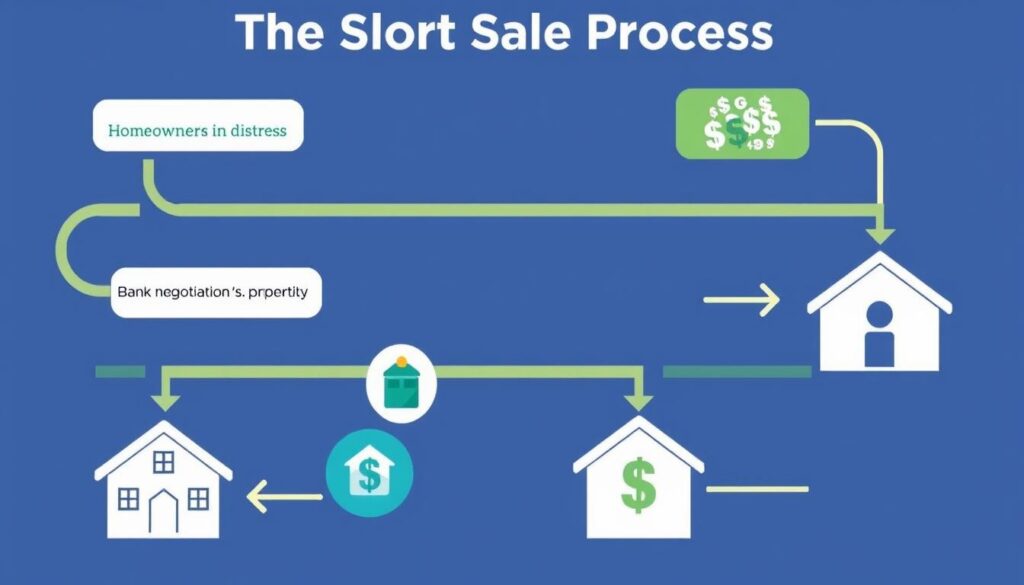Ever wondered how a home can be sold for less than what’s owed on the mortgage? This is called a short sale. It’s a key option for homeowners in tough financial spots. Knowing what a short sale is is crucial for anyone in real estate.
By learning about short sales, homeowners can manage their financial stress better. They can also protect their credit score.
Key Takeaways
- A short sale happens when a house is sold for less than the mortgage, to avoid foreclosure.
- People facing money troubles, like job loss or divorce, often choose short sales.
- Short sales can take 4-6 months, longer than usual home sales.
- Short sales hurt credit less than foreclosures do.
- Real estate agents help make the short sale process easier for buyers and sellers.
Understanding the Short Sale Home Definition
A short sale home happens when a homeowner sells their property for less than what they owe on the mortgage. This usually happens when someone is facing financial trouble. They need to explain the short sale process to understand it better.
First, the homeowner must get approval from their lender. The lender checks the homeowner’s financial situation and the property’s value. They compare it to similar properties in the area.
Short sales aim to avoid foreclosure. Unlike foreclosure, where the lender takes over the property, a short sale lets homeowners sell it themselves. This helps them keep their credit score from getting worse.
When a short sale happens, the lender makes sure the terms are okay. The homeowner must show they are financially struggling. Knowing this helps homeowners deal with their mortgage problems better.
What is a Short Sale Home?
A short sale home is sold for less than the mortgage debt. This happens when the homeowner is in financial trouble. The sale price doesn’t cover the liens on the property. Knowing about short sales helps homeowners and buyers understand this complex deal.
Key Characteristics of a Short Sale
One key thing is that lenders must agree to the sale. This makes short sales different from regular sales. The process can take weeks or even months for lenders to approve.
Lenders often prefer short sales because they might get more of their money back. Homeowners, however, face a deficiency balance. This means they owe more on the mortgage than the sale price.

Reasons Homeowners Pursue Short Sales
Homeowners choose short sales to avoid foreclosure. They might face job loss, medical emergencies, or unexpected bills. Selling short helps protect their credit score more than foreclosure does.
While foreclosure can delay getting a new mortgage for up to seven years, short sales might only take two years. Homeowners want to keep control over the sale. They see it as a proactive way to handle their financial issues.
For more on short sales, check out this guide. It explains the key aspects of short sales. It’s a complex but sometimes necessary financial move.
The Short Sale Process Explained
Homeowners facing financial troubles need to understand the short sale process. It starts when they can’t afford their mortgage payments anymore. The short sale process explained has key stages, like the first steps for homeowners and what lenders need to approve it.
Initial Steps for Homeowners
Homeowners should first collect important financial documents. These include:
- Income statements
- Bank statements
- A detailed hardship letter
Then, they must send a proposal to the lender. This proposal should explain why they need a short sale. Getting help from a real estate expert can make a big difference.
Lender Approval Requirements
Getting the lender to agree is a big challenge. Lenders check the documents to see if the homeowner really can’t pay the mortgage. They look for proof that the homeowner can’t keep up with payments.
The time it takes for lenders to decide can be long. It depends on how quickly they review the documents and how complete they are. It’s smart to get advice from legal or financial experts during this time.
Knowing what lenders need is key for homeowners. Some lenders might try to get money from the homeowner even after a short sale. For more on the short sale process, check out this resource.

Short Sale vs Foreclosure: Key Differences
Knowing the differences between short sale and foreclosure is key for homeowners in tough financial spots. A short sale lets a homeowner sell their property for less than the mortgage debt with the lender’s okay. This happens before they miss payments. Foreclosure, on the other hand, is a legal action after a homeowner misses payments, letting the lender take the property. Foreclosure can take up to 941 days, much longer than the short sale process, which can last a year.
Short sales also have less of an impact on credit scores, dropping them by 50-150 points and lasting 12 to 18 months. Foreclosures, however, can lower scores by 200-400 points and stay on reports for up to ten years. This means those who did a short sale might be able to buy a home sooner, sometimes right away or within two years. Those who went through foreclosure might have to wait five to seven years, with extra rules.
Another big difference is how mortgage balances are handled. Short sales often forgive any remaining debt, making for a smoother exit. Foreclosures, however, can lead to claims for the remaining debt in places like California. Short sales are also more private, while foreclosures are public. For those looking into these options, understanding the differences between short sale and foreclosure is vital for making the right choice.






